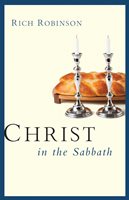Reviewed by Fred G. Zaspel
Rich Robinson (M.Div., Trinity Evangelical Divinity School; PhD., Westminster Theological Seminary) is a Jewish believer in Jesus and the senior researcher with Jews for Jesus. Throughout his Christ in the Sabbath his fond interest in his Jewish heritage comes through with attractive warmth, and his interest in the topic of Sabbath is more than merely academic. Written at the popular level it is a pleasant read throughout, and it is filled with illuminating observations – biblical, historical, and Jewish-cultural.
Strengths
Perhaps the leading strength of this book is Robinson’s helpful survey, through successive chapters, of Sabbath laws and Sabbath observance through the Old Testament, the time of Jesus and the apostles, and in Jewish culture since, including his own experience growing up in a Jewish home. Both the biblical-historical and the cultural-personal dimensions are enlightening. His summaries of rabbinic Sabbath laws are of great value to the student of the New Testament, and his survey-expositions of various important Sabbath passages along the way are consistently insightful. These chapters alone provide a valuable resource for any preacher or teacher addressing the theme.
Peculiarities
A few matters of curiosity stand out. Of course every reader will want to know what the author has to say about the continuing (or non-continuing) obligation of Sabbath observance, and as the title mildly suggests, Robinson takes a “fulfillment” view – that the Sabbath anticipates our rest in Christ. He does not hold that Scripture requires Sabbath Day observance today, whether understood in terms of Saturday or Sunday.
But what is curious is that although he explicitly takes the position that no Sabbath observance is required of the Christian in this New Covenant age, he yet asserts that a Sabbath “principle” should be observed nonetheless:
“God’s principles for Sabbath rest are still applicable, even if today He leaves the specifics of how and when to individual believers or their spiritual communities” (p.195).
This will make both sides of the discussion either happy or frustrated in that he seems to say both yes and no to the same question. He does not attempt to establish this “continuing (non-) Sabbath observance” obligation exegetically but instead grounds his remarks in health concerns and perhaps in natural theology:
“Actually, setting aside time to rest and worship is just as important for our health and well-being as it ever was. Some have even presented scientific evidence that human beings are ‘hard wired’ for a Sabbath rest of some kind on a weekly basis” (p.195).
He then proceeds to give practical counsel on how the Christian’s non-Sabbath / Sabbath “principle” weekly rest may be observed. All told he seems to say that the Christian is not obligated to keep a Sabbath day, but then again he is.
Moreover, although the title of the book promises to see Christ foreshadowed in the Sabbath (and the purpose of the Sabbath realized in the person and work of Christ), and although this is the position Robinson takes, he actually gives relatively little attention to this rich biblical theme. He provides brief arguments against the views that either Saturday or Sunday remain as a Sabbath to be observed by Christians, and he advocates the position that no Sabbath day remains for Christian observance. And he provides very brief, broad remarks regarding Christ’s fulfillment of the law of Moses (pointing only to a handful of Scripture references in parenthesis). But only in chapter 7 (“The Sabbath in Hebrews: A Brief History of Rest”) does he provide a delightful yet brief survey of the theme. For a book entitled Christ in the Sabbath, and with so much biblical material given to this rich theme, we would expect much further development than Robinson provides.
Finally, closely related to these previous remarks, there is only the very slightest treatment of the theme of the future and final fulfillment of the Sabbath in the eschaton, even in the chapter entitled, “Epilogue: Sabbath In the Future – Final Fulfillment.” Again, given the rich biblical material available on this score, the absence of it here – and that in a chapter purportedly devoted to that theme – is puzzling.
Final Assessment
Even though important theological and biblical-theological themes lack development, the strengths of this book remain. I would quibble here and there, as I indicate above, but in my judgment Robinson tracks the biblical trajectory correctly, and he has provided a genuinely useful resource for the Bible student and for busy pastors (on either side of the Sabbath fence).
Fred G. Zaspel is one of the pastors at Reformed Baptist Church of Franconia, PA, adjunct professor of Bible at Lancaster Bible College – Center for Urban Theological Studies (CUTS) in Philadelphia, and executive editor here at Books At a Glance.
